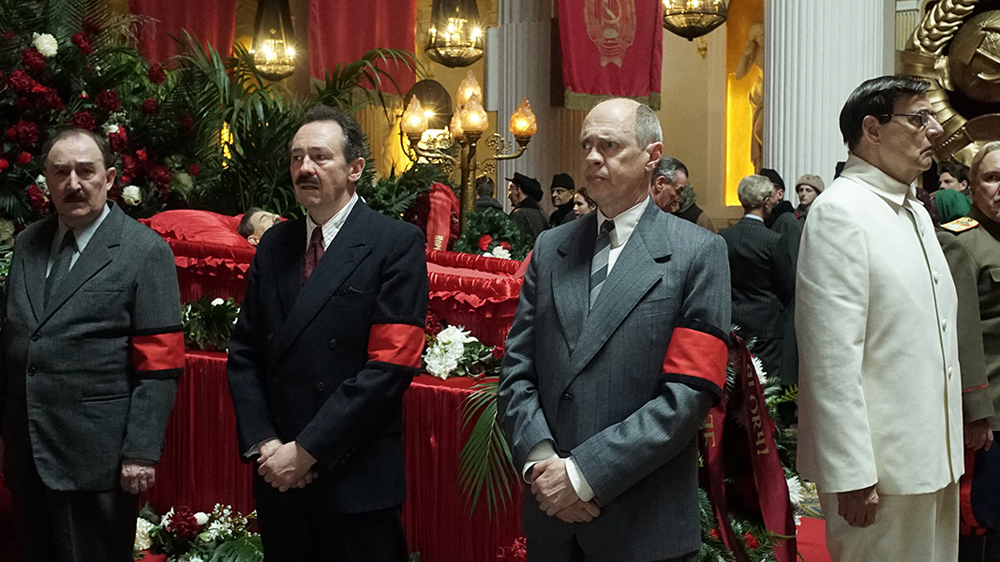Director/writer Armando Iannucci, when at the top of his game, is one of our best political satirists working in the visual medium today. I fondly recall watching In the Loop in college and killing myself over with laughter. I even marveled at the fact that someone could pack that many jokes and insults into a short period of time without losing any steam. Imagine my elation that his newest, The Death of Stalin, is much more than just a laugh riot revolving around characters going rabid at the taste of power. More than just a “now more than ever” movie of the moment, it’s power lies in the condemnation of a reality in which Stalin were to ever rule. While it doesn’t sideshow as a screed against those hindering democracy like the talking meme currently sitting in the highest office in the United States Government, it gently reminds the viewer how bad things can get and why it’s important to keep on laughing in the face of that adversity.
Stalin has died and all of his cohorts are chomping at the bit to take his throne to assume power over all of Russia. Among them are First Secretary Nikita Khruschev (Steve Buscemi), Deputy Chairman Georgy Malenkov (Jeffrey Tambor), Chief of Soviet Security Lavrenti Beria (Simon Russell Beale), and First Deputy Chairman Vyacheslav Molotov (Michael Palin). While the bloodthirsty politicians jump over each other for an opportunity at the power that Stalin held over Russia, Stalin’s children Svetlana (Andrea Riseborough) and Vasiliy (Rupert Friend) struggle to find their place in a country slowly closing in on them. All of this is done with the kind of scabrous humor you expect from Iannucci, though.
A lot of people have been bringing up the fact that everyone in this cast uses their natural accent instead of hamming up a Russian one. I wouldn’t conflate that decision with contributing to the universality of the proceedings here. By sticking to that decision, Iannucci is able to strip these characters back from their pomp and circumstance to reveal something much uglier. The Death of Stalin is incredibly adept at making you laugh until it hurts and then immediately making you question if it was okay to laugh at that last joke about pedophilia. It has the uncanny ability to make the viewer reflect upon why or how something is funny despite dire circumstances. It’s not about staring directly at a clear abuse of power in history, but more like silently nudging you to the conclusion that something like this should probably never happen again.
Luckily for the film and us, there’s a murderer’s row of comedic performers at the material’s disposal. Buscemi’s Khruschev, despite having the most screen time and arc, gets almost completely upstaged by those with smaller parts. Friend’s Vasiliy is a dangerous lush who’s personality cuts right through the other dangerous men in the room. Every single time he appears on screen, every other character fumbles to comprehend the situation. They fall silent. It’s characters like Vasiliy that reinforce what Iannucci is going for here: That chaos, no matter how rampant, is driven by ego. While the hand-holding can grow a bit tiresome, I’d like to see another mainstream filmmaker take on the daunting task of recreating one of the most disgusting times in history and laugh in its face.
Quick shout-out to Jason Isaacs, who very well may be the MVP of The Death of Stalin. His Field Marshal Georgy Zhukov arrives like a bulldozer of dangerous intention. Once again, the core group of Stalin’s cronies get disrupted by this force of vengeance and fury. In classic Iannucci fashion, that not only reflects on the humor employed by Zhukov but also about that person’s actual involvement in the events following Stalin’s passing.
The direction here is top-notch, as well. Iannucci is very invested in how things looked during those days in Russia and it shows. A lesser filmmaker would’ve made everything look garish and ugly, just like the events taking place. In this, everything is a shade of grey or brown. These giant monoliths to Stalin’s image tower over the personalities at play. No matter how hard they fight and steal, they’re battling in a rigged game. But they’re also all murderous assholes, which Iannucci never lets us forget. The notes of reality come right when the audience may be getting too invested or starting to sympathize with these terrible people.
The more and more that I reflect on The Death of Stalin, the more I’m led to believe that the best satirists are adept at showing viewers the road to conclusion. Many attempts at political humor purely poke fun at the tastelessness of it all, but this very efficiently wants to remind us that poking fun can be much more than just that. It can remind and inspire people to do better.













